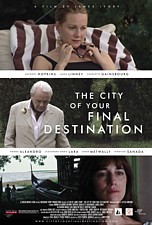
Too much of a good thing and not enough define two very different movies with innate gay
sensibilities
sensibilities
film from a queer perspective
Reviews
| KATM media outlets |
| KATM featured weekly |
| Join Us! |
| KATM on RT |
| Vidcast Starring KATM |
| NOTE: THIS SITE ONLY LOADS CORRECTLY WITH EXPLORER AND MOZILLA BROWSERS - SORRY SAFARI USERS! |
| Buy the KATM Book |
Aggressive/Passive:
Sex and the City 2-The City of Your Final Destination
Expanded Edition of 5-26-10 WCT KATM Column
By Richard Knight, Jr.
Sex and the City 2-The City of Your Final Destination
Expanded Edition of 5-26-10 WCT KATM Column
By Richard Knight, Jr.
| The Fantastic Four aka Carrie, Samantha, Miranda, and Charlotte (Sarah Jessica Parker-Kim Cattrall, out actor Cynthia Nixon, and Kristin Davis) are back in Sex and the City 2 almost exactly two years to the day after the blockbuster first movie edition just about single handedly brought women (and gay men) back into the theatres in droves. With such a big financial hit on their hands who can blame out writer-director-producer Michael Patrick King, his stars, and their supporting cast from making a return trip to Carrieland? Everything that fans of the original HBO series loved (which now seems like a cultural eon ago and is actually a good decade in the past) is here though a tad more subdued and a bit more long in the tooth. The fabulous fashions, the shoes, the trendy restaurants and nightclubs, the stunning, hot men, and the bitchy bon mots? Check. The over the top characters bordering on the stereotypical? Check. At least one sequence with a wedding so gaudy that it seems tailor-made for an episode of Bridezillas? Check. These last two items combine in the movie’s opening scenes in which the gay sidekicks, the fussy dandy Pee Wee Herman look-a-like Stanford (Willie Garson) and his one time nemesis, the loud mouth Italian wedding planner Anthony (out comic actor Mario Cantone) have now found true love with each other (for convenience’s sake apparently) and take their vows in Connecticut where “the views are breathtaking and gay marriage is legal.” The affair is color coded in black and white with a gay choir belting out “If Ever I Would Leave You,” and “Sunrise, Sunset” as the two grooms are wed by – naturally – Liza Minnelli who goes on to perform Beyonce’s “Single Ladies” at the reception. But there’s a fly in the wedding cake when Anthony tells the gals in all seriousness that getting married doesn’t mean he has to be monogamous which once again gives Carrie something to Think About. Maybe to prove that, King doesn’t so much as give us a kiss between his two gay love birds and once these two have set up the theme of the movie – as in the series – they’re dropped back into the background and not seen again. Carrie, it seems, still yearns for the old sassy, free-spirited single gal who conquered Manhattan (and plenty of hunky fellas on the way) and isn’t ready to settle down with nights spent at home or a TV in the bedroom taking Big’s (Chris Noth) attention away from her. Other mid-life crisis issues are also hitting the ladies (from menopause to fat to fidelity) so the quartet jump at the chance to head for Abu Dhabi, all expenses paid, when Miranda lands a prospective PR client with a fancy hotel. Here the movie kicks into a travel ad for the luxuries of the Middle East as the ladies hop aboard an exclusive airline ending up at a zillion star hotel/resort where they indulge their fantasy whims with a jam packed itinerary. The movie then meanders, with its share of laughs, for a long time out there in the desert (just as the first one did when the gals headed to Mexico), at times flirting uneasily with women’s rights issues (which come to a head when the ladies belt out “I Am Woman” in a karaoke bar along with their Middle East counterparts) until the fidelity/what does marriage mean? question kicks back in thanks to the reappearance of Carrie’s old love Aidan (John Corbett). Carrie, drawn to the older, slightly paunchy but still dreamy heartthrob, must face herself in the mirror as always after an illicit kiss and realize like Dorothy that there’s no place like home. Though it’s assured from the first note of the familiar Sex and the City theme that this would be the outcome, our Carrie will, as always, need time to kvetch, rebel, kick up her heels on her own yellow brick road, and kvetch some more before figuring that out and making a Big Heartfelt speech at the last second. And just as in the first go round, this Sex and the City 2 gives her all the time in the world. But unlike the first edition, which also clocked in at nearly 2 ½ hours, this time when touching back to earth the Sex and the City juggernaut leaves one feeling more than a little jetlagged. Tempting as those big box office payoffs are King might take a page from his leading character and learn that, fun as these outings are, it might be time for Carrie & Company to hang up the Manolo Blahniks and stay home once and for all. +++++++++++++++++++++++++++++++++++++++++++++++++++++++++++++++++++++ The City of Your Final Destination is the first Merchant-Ivory film without the participation of Ismail Merchant, gay director James Ivory’s business and rumored personal partner who died in 2005. So pronounced is the Merchant-Ivory imprimatur on film – based on their myriad period adaptations of classics of English literature – the phrase has come to stand for something increasingly rare in cinema: a movie as literary, sophisticated, and entertaining as the novels from which they’re adapted. But somehow, the Merchant-Ivory magic spell falters when the material moves away from a historical period and English locales. Their modern day movies have a tendency to seem creaky and out of touch (Le Divorce, Slaves of New York anyone?) and that’s one of the biggest flaws in The City of Your Final Destination, adapted by Ruth Prawer Jhabvala in her 23rd collaboration with Ivory. And the material, based on the novel by out writer Peter Cameron, also has maddening character and situation gaps that further require one to suspend disbelief. But if you can make that leap the movie offers many of the signature Merchant/Ivory/Jhabvala compensations – the pages of reflective, literary dialogue spoken by the sophisticated, artistically inclined characters, the lush locations and exquisitely framed compositions (this time accompanied by the music of Jorge Drexler instead of the usual Richard Robbins), and the uniformly expert performances from a cast that includes Anthony Hopkins (playing his first onscreen gay character), Laura Linney, and Charlotte Gainsbourg. The story focuses on Omar (the dreamy Omar Metwally), a college professor who has been turned down in his attempt to write an authorized biography by the surviving family members of a now dead writer, enshrined for penning one acclaimed novel (think J.D. Salinger or Harper Lee). At the behest of his headstrong girlfriend and fellow college prof, Deidre (Alexandra Maria Lara), Omar travels to Uruguay and Gund’s private estate, Ocho Rios, to get them to change their minds. Omar arrives at the estate and is immediately invited to stay (the first lapse in believability) by Gund's free-spirited but anxiety prone mistress Arden (Gainsbourg). He quickly meets the others – Caroline, Gund’s widow (Linney), a chilly scold, his gay brother Adam (Hopkins) and Adam’s lover Pete (an especially effective Hiroyuki Sanada) – all of whom live together in apparent, hermetically sealed harmony along with Arden’s precocious little daughter. They’re a cultured group who sip cocktails, listen to classical music, and watch old movies (Hopkins is given cravats to wear and an apparently still active sex life – we glimpse a nude Sanada lying adoringly at his side and witness a convincing amount of physical affection between the two). And though we quickly discern that even beyond the grave Gund wields tremendous influence over his survivors and is still holding sway over their lives, something they are desperate to be free of, Omar doesn’t seem to. For a biographer he doesn’t really seem to care much about digging into the life of his subject. He seems like a neophyte and not even much of an obsessed fan of Gund’s novel. He never presents credentials, barely talks about his subject. It’s an odd, very strange hiccup in the plot and on thinks, “If he weren’t such a cutie pie would any of these cultured elites give this guy the time of day?” Instead, as Omar becomes infatuated with Arden his objective fritters into the background. That is until an accident brings Deidre to Ocho Rios to shake things up. The movie’s oddly lyrical tone – helped along by the character’s self-inflicted withdrawal from the world at large to the slowly decaying estate (they’re like the French estate owners in Cambodia in Apocalypse Now Redux) – is broken by an unnecessary last act coda that feels tacked on and robs the movie of its strange, elliptical feeling. And the love affair between Omar and Arden isn’t nearly as convincing as the one between Adam and Pete. It’s this long enduring relationship – the one between the elderly gay couple – that makes The City of Your Final Destination (which has been sitting on the shelf for three years) the real reason to see the movie. Ignore the weak, central character, the cuckoo love affair, the other problems with the movie, and concentrate on these two. Aside from being delicately and simply presented – if I don’t miss my guess – this relationship also serves as a fitting tribute to Merchant by Ivory. |





